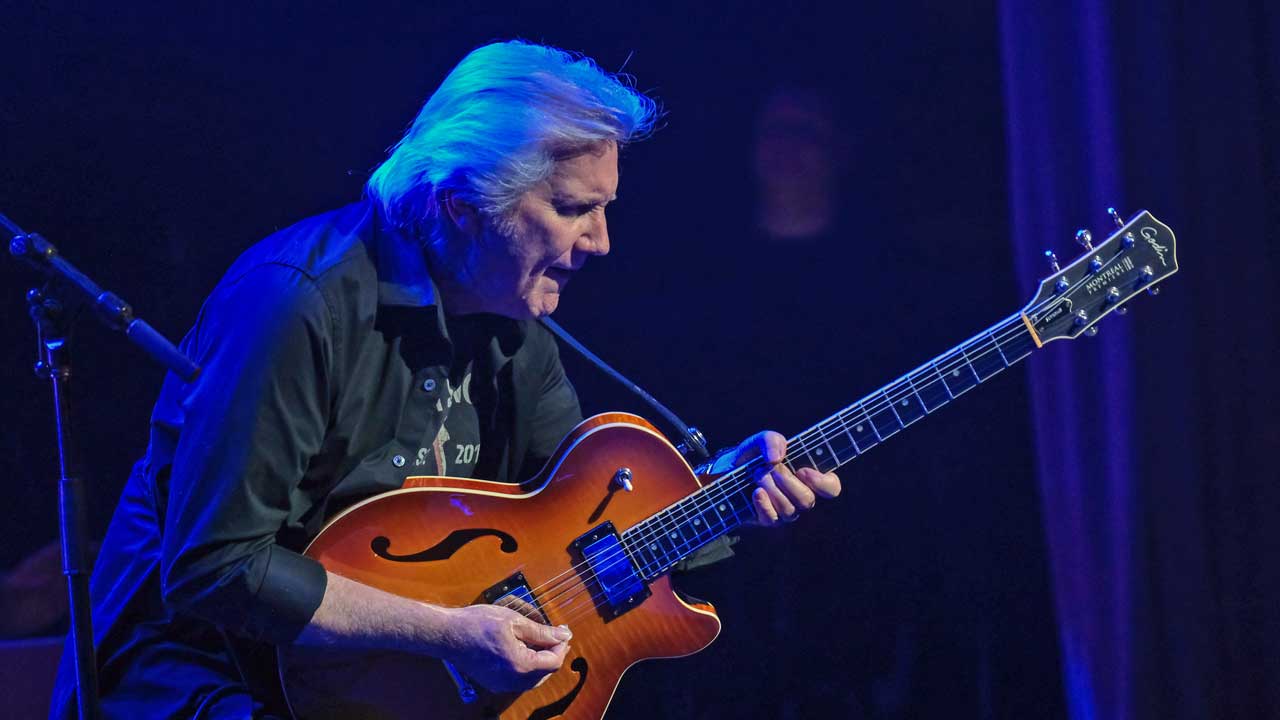"These guys are simply timeless": Triumph's Rik Emmett picks five essential guitar albums
Canadian guitar legend and founding member of Triumph Rik Emmett picks five guitar classics that inspired his own path

Like so many others, Rik Emmett cites The Beatles as being a significant influence on his musical path.
“I was born in 1953, so I was the right age when The Beatles first started to happen. I guess I would listen to those early singles with my friends, and we’d strum tennis racquets along to the guitar sounds!
“Listening to guitarists on American TV shows also made its impact on me. That might be the first time I really heard any guitar being played in such a way that it stood out. People like Roy Clarke and Chet Atkins grabbed my attention.”
But he readily admits that he can discern on any recording exactly what makes it work.
“I drive my wife mad. Because I am the sort of person who will listen to a track and say, ‘I love the way the bass sounds’. Or, ‘That guitar style is really interesting!’. It drives her mad, because she can’t filter out the instruments the way I can, and just wants to enjoy the overall sound.”
But Emmett reveals that when it comes to choosing his five albums here, he’s gonna cheat a little.
“I want to mention more than just one guitarist per album. So, I will use my choices as a springboard to bring others in. But there is one thing that connects these albums. All the guitarists I aim to bring to your attention here are imbued with classic values, the sort which will never go away. These guys are simply timeless.”
Sign up below to get the latest from Classic Rock, plus exclusive special offers, direct to your inbox!

John Mayall & The Bluesbreakers - Bluesbreakers With Eric Clapton (1966)
“I wanted to start out with what people call The Beano Album. When I first heard this, I was in a garage or basement band with friends from high school. And this album made such a big impression on me that I spent ages trying to learn the guitar licks Clapton was producing here. To me, the sound of the guitar on this record was such a big thing. Even after all these decades, it still comes across as remarkable and fresh.”
Jeff Beck - Blow By Blow (1975)
“This was a watershed album, because Beck was doing some amazing things. And when you listen to the way he played on the song Cause We’ve Ended As Lovers, you just know he’s channelling Roy Buchanan, which is no bad thing.
“But in my cheating phase, as I’ve mentioned Clapton and Beck, then I have to also nod to Jimmy Page, the third of the great Yardbirds triumvirate of guitarists. The debut Led Zeppelin album was a game-changer for me, as it was for so many others. But his solo on Since I’ve Been Loving You from Led Zeppelin III drew so heavily from the American blues tradition, yet did it at a time when nobody in America was doing this.
"He took an American way of playing, and was so good at it that he inspired a young generation of American guitarists to go down the same route. The only American at the time who was doing anything comparable was Carlos Santana, on the song Europa (Earth’s Cry Heaven’s Smile) from the Santana album Amigos.
“Page and Beck both had the ability to channel the Chicago blues guys like few others. And the rest of us took our cues from them.”
Joe Pass - Intercontinental (1970)
“I came to jazz a little late, but Joe Pass I love. There’s a track here called Lil’ Darlin’ which was written by Neal Hefti. Now, he was a trumpet player, who had done a lot of arranging and writing for Count Basie. This is one of his compositions for Basie, and Pass did such a beautiful interpretation here. It made a big impression on me.
“And if we’re talking of Pass, then I must also mention Kenny Burrell, a jazz guitarist who was a big influence on Stevie Ray Vaughan. He covered the Hefti tune Girl Talk on his 1966 album The Tender Gender and did it with a beautiful, gentle, intelligent
Pat Metheny - Still Life (Talking) (1987), We Live Here (1995)
“Actually, any of Metheny’s albums from the late 80s to the mid 90s should be considered. It was a great period for him. In his playing style, Metheny could be a model of tenderness. But there was also a very adventurous side in what he tackled. He could challenge himself and his audience, and was prepared to compromise.
At times I listened to what he was doing and couldn’t fathom out where the man was going musically. Metheny was the sort of musician who followed his own course, and never allowed anything to get in the way of the creative spurt. Listen to If I Could from his 1984 album First Circle… the playing was so heartfelt.”
Yes - Fragile (1971)
“I came across Steve Howe when I was just started to move out of my Ritchie Blackmore phase, and discovering the joys of progressive music. Listening to Fragile made me appreciate that Howe was the man to pique my interest in this style of music.
“I also loved Steve Hackett in Genesis, Jan Akkerman from Focus. Like Howe, these were guitarists who represented what for me was one of the most exciting things about prog: it was eclectic. They were not afraid to bring in a 12-string guitar or a slide guitar part if they felt it was needed. Nothing was barred.
“For me, prog has never been about the songs. But about the symphonic constructions. Howe, Hackett, Akkerman and the like could fiddle, tiddle and move about musically, whenever the mood took them. For me, as a 17-year-old, that was so appealing.”
This feature was originally published in 2014. Triumph have announced a 50th Anniversary tour for 2026.
Malcolm Dome had an illustrious and celebrated career which stretched back to working for Record Mirror magazine in the late 70s and Metal Fury in the early 80s before joining Kerrang! at its launch in 1981. His first book, Encyclopedia Metallica, published in 1981, may have been the inspiration for the name of a certain band formed that same year. Dome is also credited with inventing the term "thrash metal" while writing about the Anthrax song Metal Thrashing Mad in 1984. With the launch of Classic Rock magazine in 1998 he became involved with that title, sister magazine Metal Hammer, and was a contributor to Prog magazine since its inception in 2009. He died in 2021.
You must confirm your public display name before commenting
Please logout and then login again, you will then be prompted to enter your display name.






